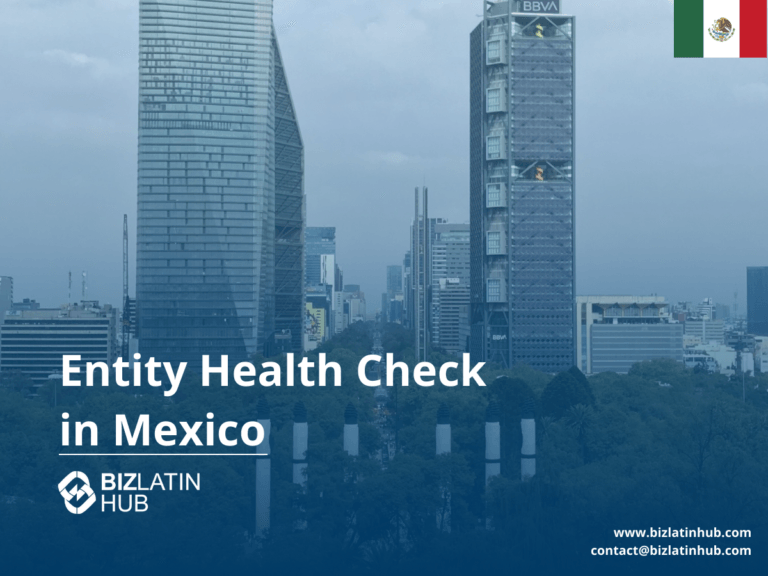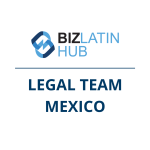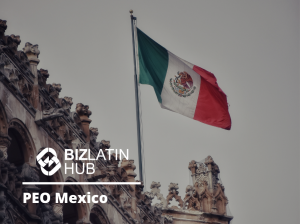Companies operating in Mexico need regular entity health checks to ensure compliance with Mexican regulations. An entity health check in Mexico serves as comprehensive due diligence Mexico companies require to avoid penalties and maintain good standing with authorities. Annual reviews protect your subsidiary or branch from unforeseen risks after company formation in Mexico.
Key takeaways on an entity health check in Mexico
| Topic | Key Information |
|---|---|
| Main compliance areas | Corporate structure, SAT tax obligations, IMSS social security, labor law (LFT), data protection (LFPDPPP) |
| Critical deadlines | April 30 (ordinary shareholder meetings), March 17 (annual tax return), monthly IMSS payments by day 17 |
| Who needs health checks | All Mexican entities, especially S.A. de C.V. and S. de R.L. companies, foreign subsidiaries, M&A participants |
| Frequency recommended | Annual reviews for most companies, quarterly for maquiladoras and IMMEX permit holders |
| Common violations | Late SAT filings, missing RFC updates, incomplete IMSS registrations, unsigned shareholder meeting minutes |
| Cost-saving tip | Schedule health checks with annual compliance tasks to reduce professional fees by up to 35% |
What is an entity health check in Mexico?
An entity health check in Mexico provides comprehensive corporate due diligence Mexico businesses need to assess critical compliance elements. This review, essential for Mexico entity verification, examines fiscal, legal, and operational activities to identify discrepancies requiring remediation.
This health check reflects what, if anything, your company needs to do to stay compliant with local law. Sometimes a company’s Directors cannot accurately assess the overall compliance status, or don’t possess the legal or financial know-how to understand their compliance requirements in Mexico. It pays to get a professional external auditor to conduct this review on the company’s behalf.
Core Components of Mexico Compliance Check:
The checks review all fiscal, legal and other operational activities of a company, and raise any discrepancies or issues to be remedied. This includes:
- Assessing the commercial context of the company – are there any specific requirements the company must adhere to specific to its industry or activity?
- Industry-specific requirements under Mexican law
- Reviewing registry filings, minutes of meetings and statutory registers
- Public Registry of Commerce (RPC) documentation
- Evaluating finances, social security payments and other taxes.
- SAT obligations, social security (IMSS/INFONAVIT) payments.
When should I get an entity health check for my company?
Routine legal due diligence Mexico proves essential for:
- Demonstrating to potential partners and clients that you’re working in full compliance with regulations in Mexico
- Checking the status of a company before acquiring or merging with it
- Applying for a loan or other type of funding.
EXPERT TIP: Schedule your entity health check in February or early March to allow time for corrections before the April 30 deadline for ordinary shareholder meetings required by Mexican Corporate Law (LGSM).
Corporate compliance in Mexico
Corporate compliance in Mexico is broken down into several areas.
Business objectives: Does the company follows its initial vision and maintain its company policies? The company must follow the strategies and plans laid out in its own policies and constitution. Companies must follow their constitutive bylaws (estatutos sociales) filed with the Public Registry of Commerce. Any deviation requires formal amendment through shareholder resolution.
Legal due diligence Mexico requirements include: contract reviews with Mexican counterparties, maintenance of corporate books (libros corporativos), lease agreements compliant with Mexican Civil Code, intellectual property registrations with IMPI, and labor contracts following Federal Labor Law (LFT).
Finance and cash flow: The company must undertake regular reviews of its finances and bookkeeping. These are essential for decision making for the Directors and members of the board. The company’s financial experts must ensure that cash flow meets the requirements to generate a positive cash flow. Mexican companies must maintain electronic accounting (contabilidad electrónica) for SAT and manage CFDI invoices properly.
Human Resources: For many companies, people are their most important asset. A detailed entity health check should therefore also include a plan for optimal development of human resources practices to find and manage the best people to run the business. HR practices must align with Federal Labor Law (Ley Federal del Trabajo), IMSS and INFONAVIT registration requirements, and profit sharing (PTU) obligations.
Legal compliance requirements
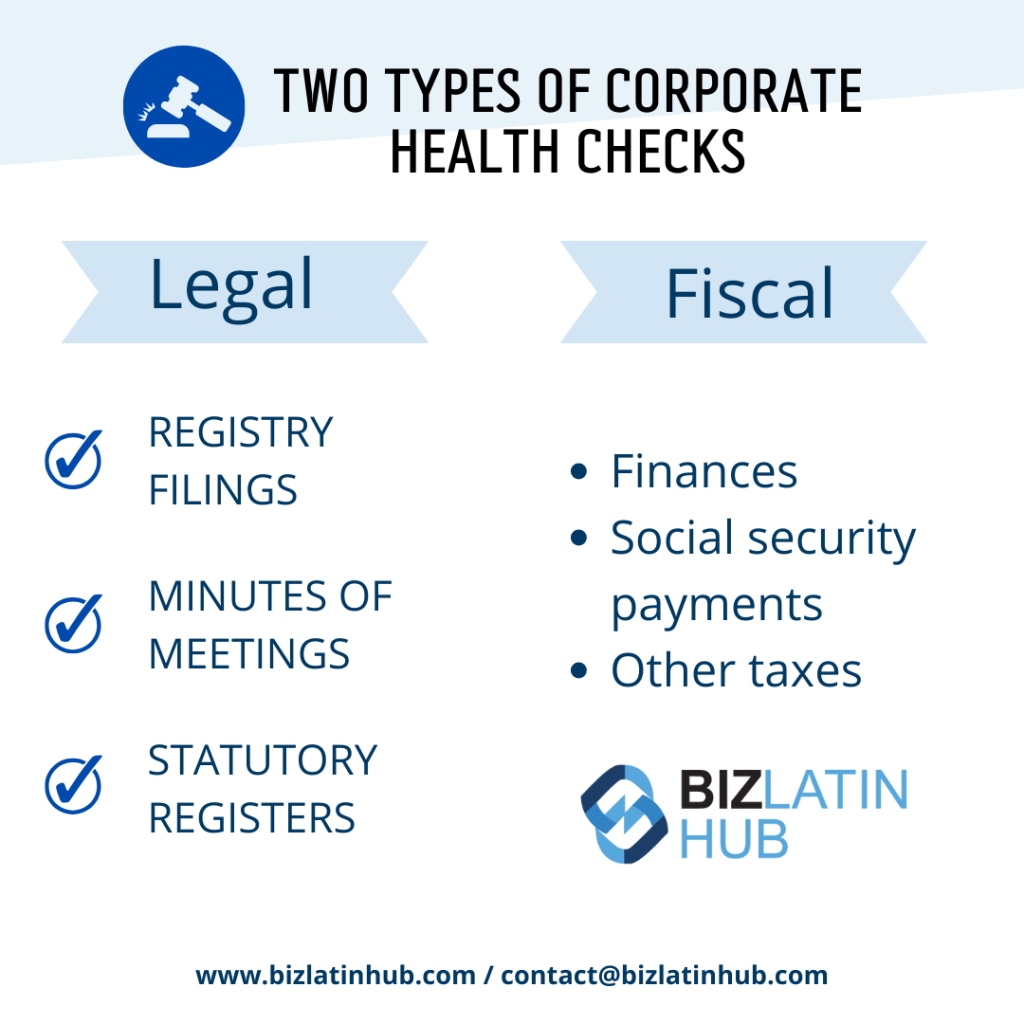
Along with corporate compliance, a company must comply with two main areas that are vital for the proper function of the company: legal and fiscal compliance.
It is crucial to regularly review the company’s legal corporate activity in Mexico. Documentation that would fall under this area of an entity health check in Mexico include (but is not limited to):
- contracts signed with third parties
- corporate books (including minutes and other shareholder meeting notes)
- landlord or leasing agencies
- intellectual property agreements or trademark registrations.
Essential Legal Documentation:
Corporate due diligence Mexico mandates regular review of:
- Shareholder meeting minutes – Must be notarized and registered
- Power of attorney documents – Valid and properly registered
- Corporate bylaws updates – Reflecting current operations
- Trademark registrations – Active status with IMPI
In Mexico, all companies must hold an ordinary shareholders meeting once a year. For this, all information regarding the increase of capital stock, admission of new shareholders, and other agreements reached at the assembly must be stated and notarized to comply with Mexican corporate regulations.
Fiscal compliance requirements
Fiscal Mexico entity verification represents the most critical component, including complete audit of SAT compliance status.
The SAT produces a certification of good standing to a company, called ‘Opinión Del Cumplimiento de Obligaciones Fiscales’. This certification confirms whether or not the company is in full compliance with all mandatory fiscal contributions in Mexico. If applicable, it will outline any outstanding fiscal obligations the company has not complied with.
A negative certification can affect a company’s credit score and result in visits from the fiscal authorities, fines, surcharges, and other complications.
Key Fiscal Deadlines:
Mexican companies must meet critical fiscal deadlines including monthly declarations by day 17 of each month, annual tax returns by March 31, and both ISR provisional payments and VAT returns monthly by day 17.
EXPERT TIP: Request your SAT compliance opinion quarterly. Negative opinions affect credit ratings and trigger tax authority audits. The certificate expires after 30 days, so timing matters for transactions.”
For the fiscal entity health check in Mexico, it’s important to keep in mind that for any legal activities such as liquidation, dissolution, and merging, the company must be fully compliant with its fiscal obligations in order to proceed.
FAQs on an entity health check in Mexico
1. Why should you get an entity health check?
Entity health checks provide essential due diligence Mexico benefits including risk reduction for penalties ranging from MXN 1,400 to MXN 34,730 per violation.
The main advantages of conducting an entity health check include:
- To enable executives to know how the business is being managed
- To reduce risks of penalties and negative reputation
- To reduce transaction risks
2. What steps are there to an entity health check?
Carrying out a successful entity health check involves the following 3 key steps:
1. Information collection
When carrying out an entity health check, a large amount of information will have to be gathered. This will include collecting data from your company’s operations, legal, accounting, and administrative departments.
Note that a best practice many companies are adopting is the creation of a compliance or audit department, in charge of centralizing important company information, which eases this first step.
2. Information validation
Mexico compliance check procedures include: cross-reference against SAT databases, verify with Public Registry of Commerce, confirm IMSS and INFONAVIT status, and validate permits with relevant authorities.
3. Record Keeping
Records of all the documents and evaluations made during your entity health check will not only be valuable for presenting to tax authorities in case of an inspection, but also during future entity health checks. In some cases, keeping such records is a legal obligation, due to laws desiged to prevent money laundering. Maintain records for 5 years minimum (tax documentation), duration of employment plus 1 year (labor records), and permanent retention (corporate books).
3. What happens in an entity health check?
Comprehensive legal due diligence Mexico examines: SAT tax compliance status, IMSS/INFONAVIT payment history, corporate book maintenance, monthly tax return accuracy, certificate and permit renewals, financial statement preparation, and annual report submissions.
4. Who can perform an entity health check in Mexico?
Entity health checks require: independent certified auditors (Contador Público Certificado), knowledge of Mexican corporate law (LGSM), SAT authorized tax advisors, and experience with Mexican authorities. Choose auditors registered with Mexican Institute of Public Accountants (IMCP) for credibility with tax authorities.
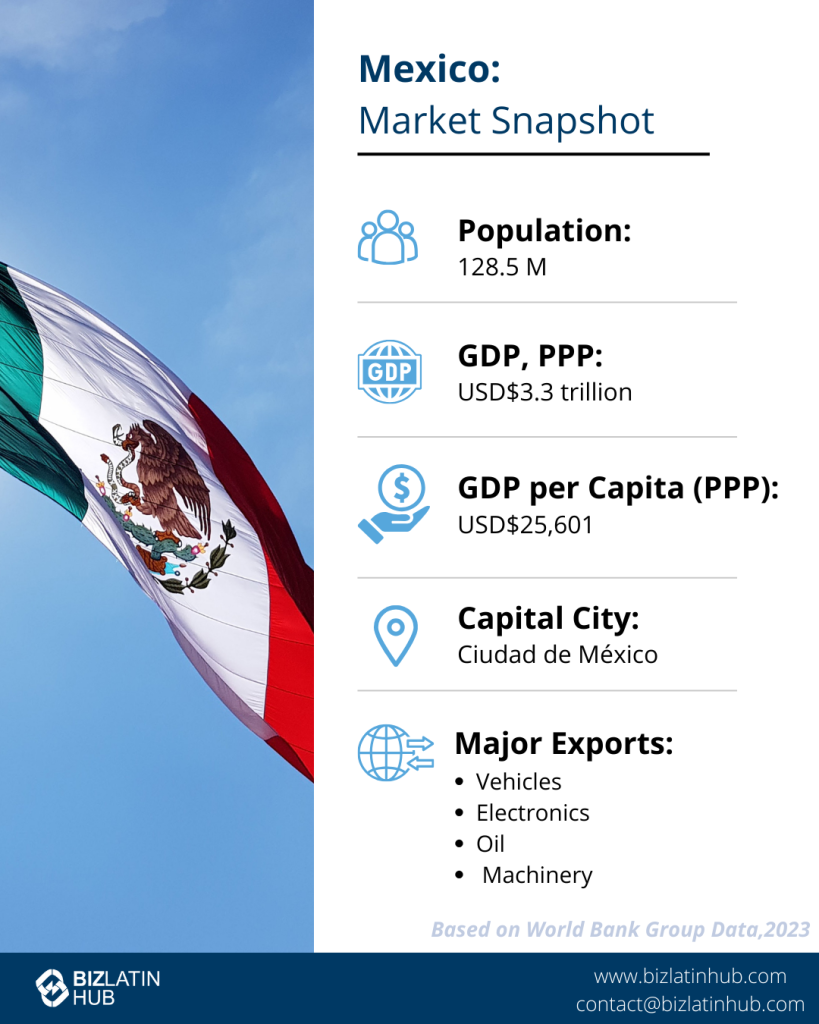
Industry-Specific Compliance Tips
Manufacturing companies operating as maquiladoras need quarterly IMMEX compliance reviews, customs audit preparation, and transfer pricing documentation. Service companies must ensure professional services tax compliance, meet digital services VAT requirements, and complete foreign service provider registration. Retail operations require PROFECO compliance for consumer protection, electronic invoicing through CFDI, and adherence to cash transaction limits.
Engage with Biz Latin Hub to complete your entity health check in Mexico
Professional corporate due diligence Mexico requires experienced auditors familiar with Mexican regulations. Conducting routine entity health checks protects your business from penalties imposed by SAT, IMSS, and other government institutions.
At Biz Latin Hub, our auditors provide comprehensive Mexico entity verification services throughout Mexico and Latin America. Our bilingual team offers specialized support to improve your company’s corporate compliance, increase business value, and manage non-compliance risks.
Contact our multilingual legal and accounting experts today here at Biz Latin Hub for tailored support for your operations in Mexico.
Learn about our team and expert authors.

